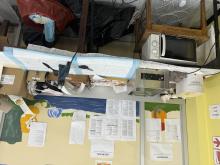Strengthening Rehabilitation and Assistive Technology services in Namibia: A Strategic Step Forward
From 21 to 23 May 2025, the Ministry of Health and Social Services (MoHSS) in collaboration with the World Health Organization (WHO), the National Rehabilitation and Assistive Technology (AT) Technical Working Group and other partners, convened a national workshop in Windhoek to develop the country’s first National Rehabilitation and AT Strategic Plan. The workshop focused on reviewing the findings of the recent situation assessment and confirming strategic priorities to address identified country-specific gaps effectively. The workshop also initiated the development of a robust monitoring and evaluation framework to foster sustainable improvements. The Strategic Plan, covering the five-year period from 2026 to 2030, is aimed to inform mid-to-long term strategic planning and monitoring of rehabilitation and AT services in Namibia, with the goal of enhancing political prioritization, strengthening commitment, and securing increased resourcing for rehabilitation and AT services.
Rehabilitation and AT are essential components of comprehensive health services, aimed at improving individuals’ functionality and quality of life, making them central to health and well-being. They are critical for achieving Universal Health Coverage (UHC) by extending care beyond prevention and treatment to include long-term recovery and support. In Namibia, rehabilitation services are partially available across all 14 regions and are currently offered at tertiary, secondary, and district levels, however, remain inaccessible at clinics and health centers. As demand for rehabilitation continues to grow, it is imperative for MoHSS to strengthen access to quality rehabilitation and assistive technology services for all who need them.
Globally, data reveals that 1 in 3 people could benefit from rehabilitation, while over 2.5 billion require assistive products. Despite this growing demand, more than half of those in need do not receive rehabilitation services. This prompted the adoption of World Health Assembly Resolution 76.6 in 2023, which calls for the integration of rehabilitation into national health systems. In Namibia, rehabilitation services remain unavailable at many Primary Health Centers and clinics. The shortage of rehabilitation professionals is low per capita, with a general density of 3.8 of rehabilitation professionals per 10,000 inhabitants. These persistent challenges significantly hinder the effective implementation and delivery of rehabilitation services across the country.
In his keynote address, Mr. Penda Ithindi, Executive Director of MoHSS, highlighted that 1 in 5 Namibians has a condition that could benefit from rehabilitation; however, rehabilitation needs remain largely unmet. “As a ministry, we have embarked on a deliberate strategic intervention to integrate and strengthen rehabilitation and assistive technology within the health system to address these gaps,” he stated. He further emphasized that “achieving Universal Health Coverage is not possible without robust rehabilitation and assistive technology services for all. Investing in these services is investing in a healthier, more inclusive society".
With support from WHO, Namibia conducted a comprehensive National Systematic Assessment of Rehabilitation Situation (STARS) in 2024. The assessment aimed to support the government in evaluating the current state of rehabilitation and AT services, and generating a standardized, high-quality report to inform strategic planning. The process identified key strengths and weaknesses within the system and provided clear, evidence-based recommendations to guide improvements and enhance service delivery across the country.
Speaking on behalf of WHO, Dr. Juliet Nabyonga, Health Systems Advisor, commended MoHSS and partners for initiating the development of a Strategic Plan to address rehabilitation service gaps. She emphasized that rehabilitation is essential to optimizing function, reducing disability, and achieving UHC through Primary Health Care. Dr. Nabyonga reaffirmed WHO’s support, noting that the organization continues to assist MoHSS in implementing the WHO Rehabilitation in Health Systems: Guide for Action, a structured framework guiding countries through assessment and strategic planning.
During the workshop, group work played a key role in fostering collaboration and shaping a comprehensive Strategic Plan. The Technical Working Group ensured alignment with the Ministerial Strategic Plan (2025/26–2030/31) and developed a monitoring and evaluation framework to support effective implementation and accountability.



